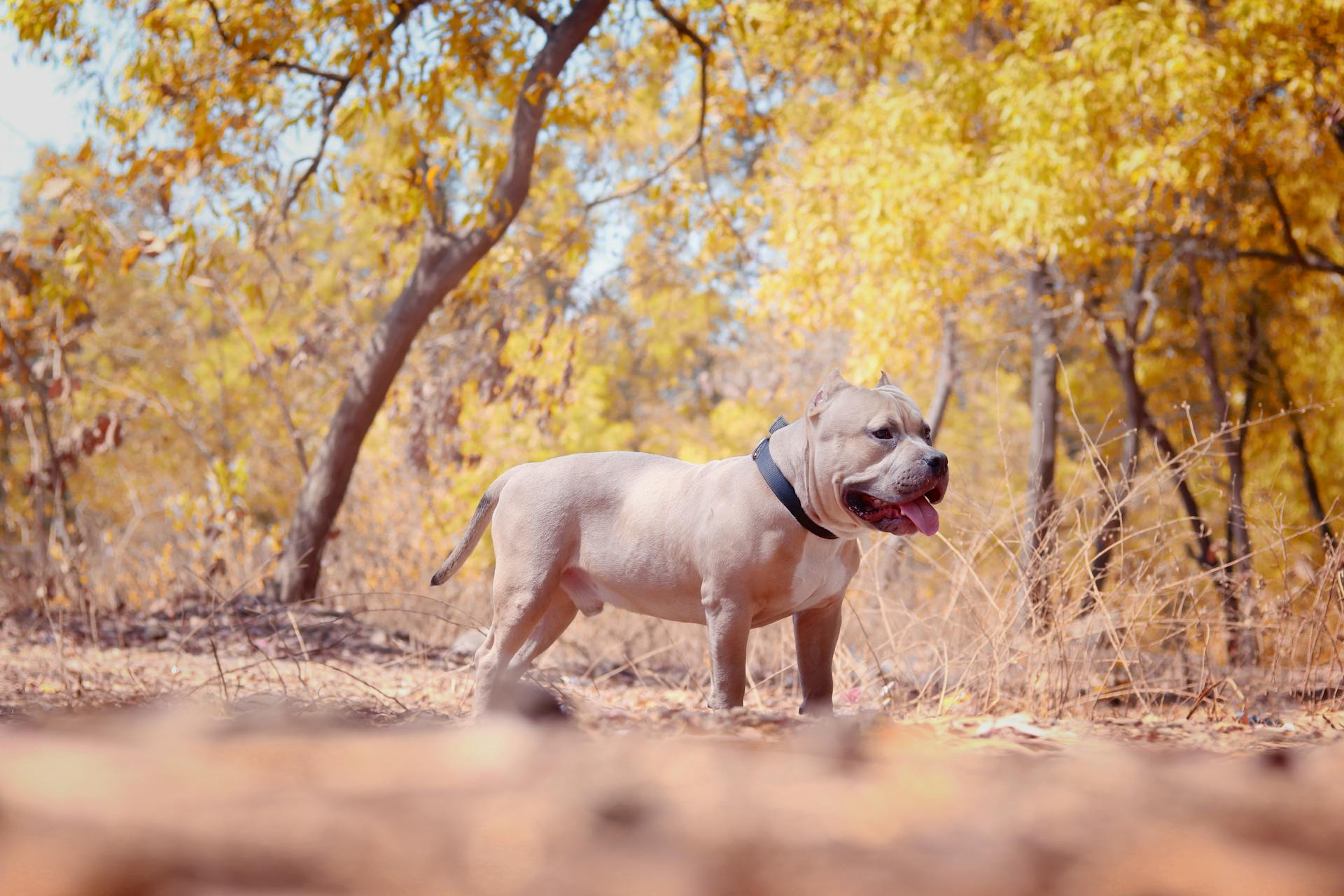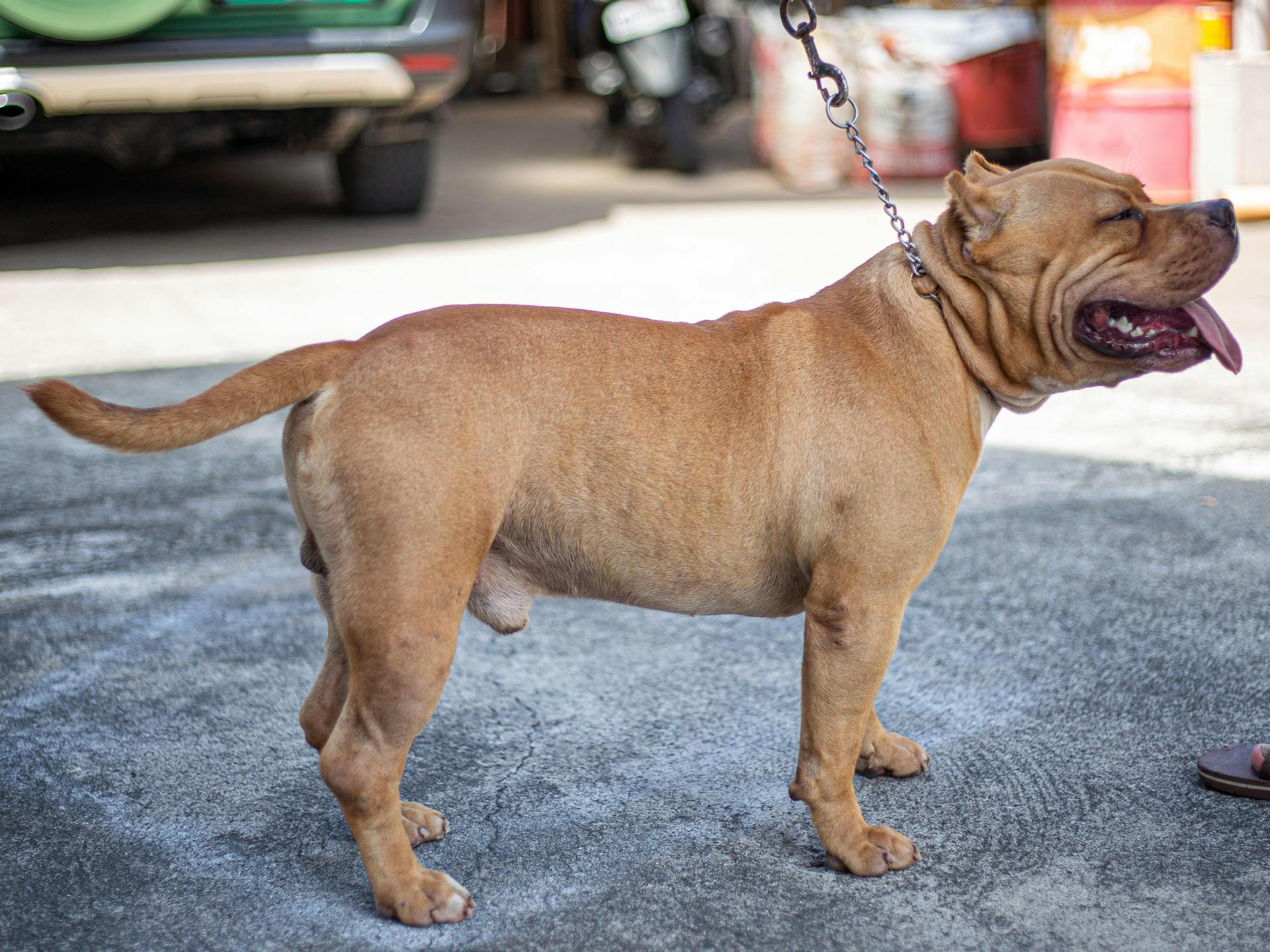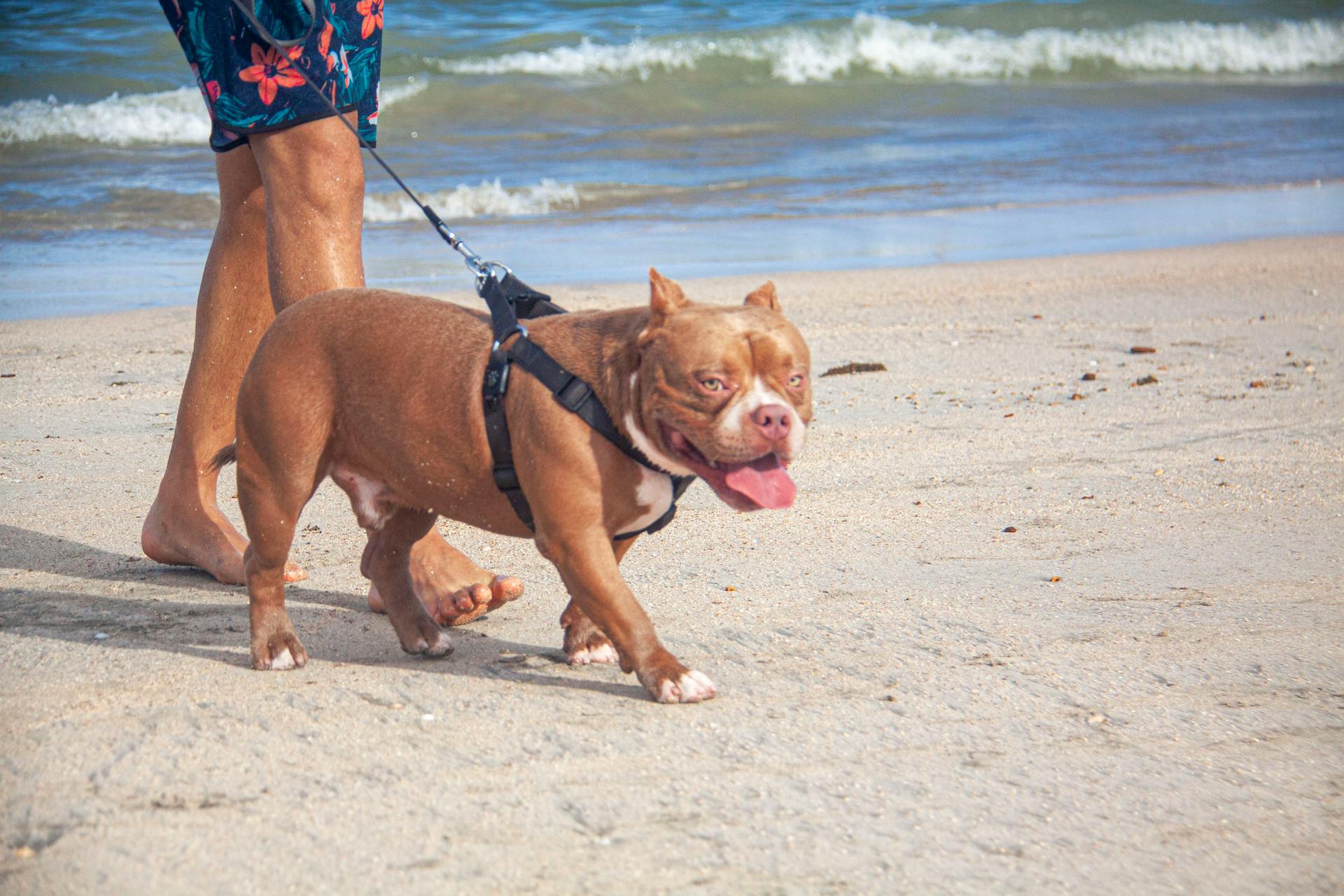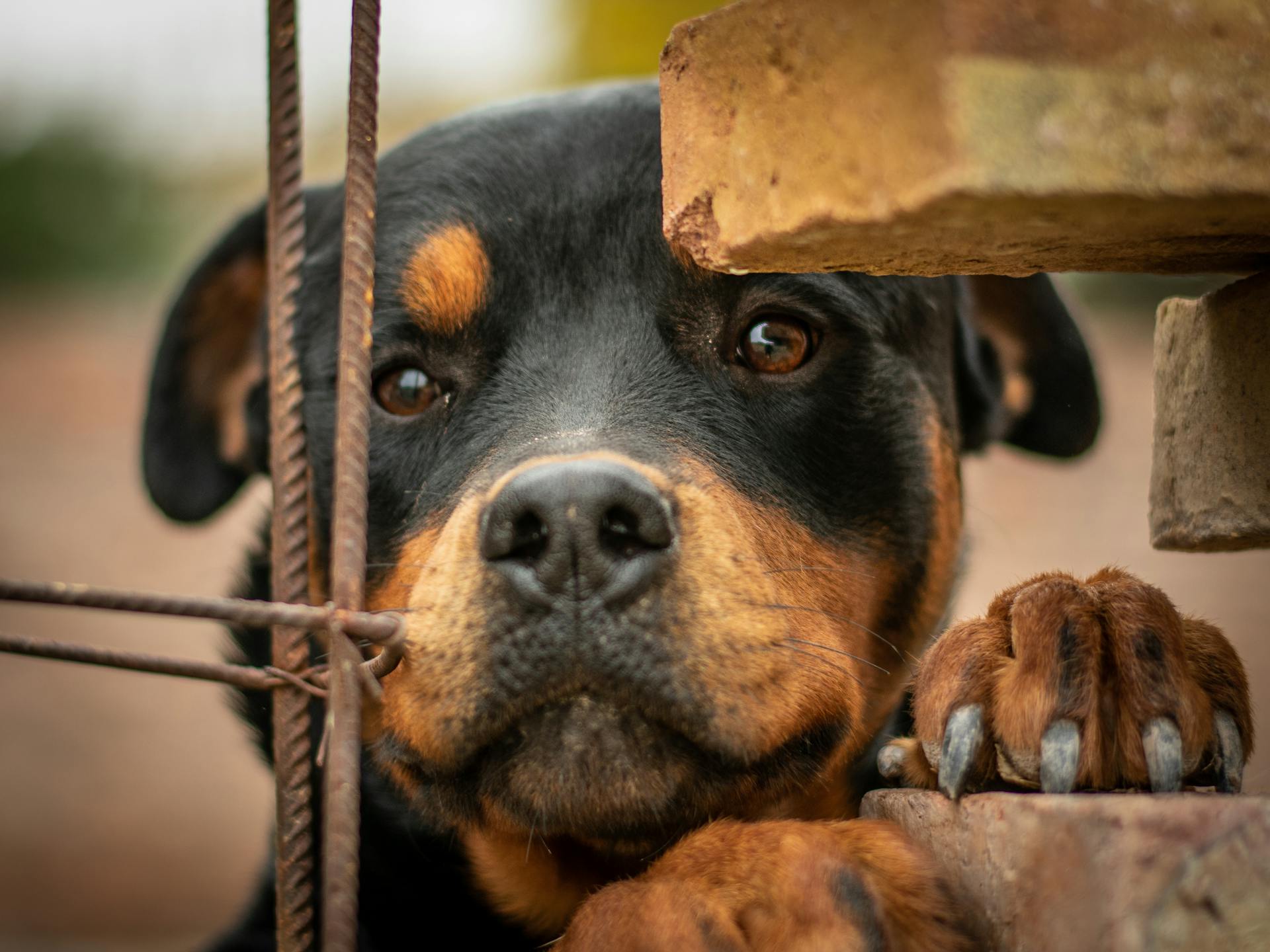
The American Bully Red Nose Pitbull is a unique breed that's gained popularity in recent years. This breed is known for its distinctive red nose, which is a result of a genetic variation that affects the production of melanin.
They're a relatively new breed, developed in the 1990s by breeding Pitbulls with other breeds to create a more muscular and compact dog. The American Bully Red Nose Pitbull is a versatile breed that excels in various activities, including agility, obedience, and even therapy work.
Their short coats require minimal grooming, making them a great choice for busy owners. In terms of exercise needs, they require regular physical activity to stay happy and healthy, but they're not high-energy dogs and can adapt to apartment living.
They're generally a friendly and outgoing breed, but as with any breed, socialization is key to ensuring they grow into well-adjusted adult dogs.
Physical Characteristics
The American Bully Red Nose Pitbull has a unique appearance that sets it apart from other breeds.
Their head is broad and chiseled, with a distinctive heavy and large shape. The skull is deep throughout and well-chiseled, with pronounced cheek muscles.
Their eyes are a key feature, with all colors accepted except albinism, which is a disqualification. The eye shape is oval to almond, low down in the skull and set far apart.
Their muzzle is short to medium in length and broad in width, with a blocky or slightly squared shape that falls away abruptly below the eyes.
Their jaws are well-defined, with a strong and powerful build. The under jaw is parallel to the muzzle and never turns upward.
Their lips are semi-close and even, with minimal looseness accepted but not preferred.
Their body is heavily muscled, with a massive bulky type that gives the impression of great power for its size. The ribs are well-rounded, creating a barrel chest with all ribs close together.
Their forelegs are set wide apart to permit chest development, and their chest is broad, deep, and well-filled in.
Here's an interesting read: American Bully Skull
Health and Maintenance
The American Bully Red Nose Pitbull is a relatively hardy breed, but like all dogs, they do need regular maintenance to stay healthy. They have short hair, so brushing is not necessary often, but a quick brushing with a soft bristle brush once or twice a week can help keep shedding to a minimum.
To prevent skin conditions, check your dog's coat regularly for anything out of the ordinary like scabs or hot spots. They are also prone to joint problems due to their posture, so keeping them at a healthy weight is essential.
Your American Bully Red Nose Pitbull will need regular veterinary exams, screenings, blood work, and vaccinations to stay healthy. They are more susceptible to health issues like allergies, joint problems, and skin conditions, so be vigilant and catch any problems early.
Recommended read: How to Treat American Bully Skin Problems
Breed Maintenance
Breed Maintenance is an essential part of being a responsible dog owner. Brushing your dog's coat is a crucial part of their maintenance, but the frequency depends on the breed. For breeds with short hair like the Bullypit, a quick brushing once or twice a week is enough to keep shedding to a minimum.
For Red Nose Pitbulls, daily brushing is necessary to distribute the oils in their fur evenly, but this is easy due to their fine and smooth coat. Brushing their coat daily will also prevent tangles from forming.
Bathing your dog too often can result in dry skin, so it's best to limit it to once a month or when needed. Use a dog shampoo to avoid irritating their skin, especially for Red Nose Pitbulls who are prone to skin irritation.
Checking your dog's ears regularly is also important to prevent infections. For Bullypits, this should be done once a week while cleaning their ears, and be sure to check for redness, wax buildup, and ear mites. Red Nose Pitbulls also require regular ear checks to prevent infections.
See what others are reading: Smooth Haired Fox Terrier Puppies
Known Health Issues
Red Nose Pitbulls are generally a hardy breed with fewer health issues than many others, but they can still suffer from joint problems due to their heavy frame, which puts strain on their ligaments and joints.
This can lead to chronic damage and even leg lameness, especially if they become overweight. Regular exercise and a balanced diet are crucial to maintaining a healthy weight.
Skin conditions are another issue that can affect Red Nose Pitbulls, so it's essential to check their coat regularly for any scabs or hot spots.
Retinal degradation is also a concern, which can affect their vision, so if you notice any changes in your dog's sight, take them to the vet right away.
Hip dysplasia, degenerative myelopathy, and kneecap dislocation are three other health problems that can affect Red Nose Pitbulls.
See what others are reading: Are Xl Bully Pitbulls
Ensuring Your Health
Routine veterinary exams, screenings, blood work, and vaccinations are important ways to help your Pit Bull avoid or minimize health issues later on. Your Pit Bull puppy will need several vaccinations in their first 6 months of life, and then should be seen at least once a year for a routine health exam.
Preventative care is always better than treatment when it comes to caring for your Pit Bull. Regular check-ups can help identify potential issues before they become major problems.
Pit Bulls are more susceptible to various health issues, including allergies, torn knee ligaments, thyroid problems, hip dysplasia, and cataracts. Allergies are more common in Pit Bulls, and can cause itchy skin, frequent ear infections, and excessive rubbing of the face.
Allergies can be treated, but it's essential to consult with your veterinarian if you notice any signs of allergies in your Pit Bull. Consult with your vet for your next steps in treating your pup's allergies.
A fresh viewpoint: American Bully Food Allergies
Lifespan
A Red Nose Pitbull's lifespan is quite impressive, with an average life expectancy of about 14 years.
Their hardiness allows them to thrive for many years, but some have been known to live up to 16 years.
Explore further: 100 Years Ago Original Boston Terrier
Similar Maintenance Breeds
If you're considering a Bullypit as a pet, you may also want to look into similar maintenance breeds. The Aussalier, for example, is 100% similar to the Bullypit in terms of maintenance needs.
The Boxweiler is another breed that requires similar care and attention. It's essential to research and understand the needs of any breed before bringing it home.
If you're looking for a breed that's easy to groom, the Beagi may be a good option. It's 100% similar to the Bullypit in this regard.
The Ba-Shar and Bogle are also breeds that are similar to the Bullypit in terms of maintenance. They all require regular exercise and attention to stay happy and healthy.
Here are some breeds that are 100% similar to the Bullypit in terms of maintenance needs:
- Aussalier
- Boxweiler
- Beagi
- Ba-Shar
- Bogle
Temperament and Behavior
The American Bully Red Nose Pitbull is a loving and gentle breed, but it's essential to establish a clear leader in the household to avoid any potential aggression issues. They crave interaction and attention, and with proper training, they can make perfect family pets.
These dogs are highly intelligent and respond well to positive reinforcement, rewards, and praise. They love treats and toys when they do something right, making training a fun and rewarding experience.
With early socialization, your Red Nose Pitbull will learn to react calmly in unfamiliar situations and become a sociable companion.
Temperament
Red Nose Pitbulls are known for being sweet and loving dogs, but they do require proper training and socialization from an early age.
They crave interaction, attention, and companionship, and love to be around their family members. They are great pets for families with children, but it's essential to have experience with training larger dogs before bringing a Red Nose Pitbull into your home.
Red Nose Pitbulls can become destructive if left alone for long periods, so it's crucial to provide them with plenty of toys and a safe space to relax. They can show signs of separation anxiety if left alone for more than 3-4 hours at a time.
To establish a strong bond with your Red Nose Pitbull, it's essential to show them love and affection, even when they don't respond correctly to a command. This will actually speed up the training process and make it much easier for you.
Red Nose Pitbulls are intelligent animals that work well with positive reinforcement, rewards, and praise. They love treats and toys when they do something right, which makes training a breeze.
Consider reading: Can Maltese Dogs Be Left Alone
Temperament and Behavior

Red Nose Pitbull Terriers are a strong and active breed that benefit from being outside. They need a good diet to stay healthy and a lot of social interaction from you.
They require at least an hour to 90 minutes of moderate exercise daily to stay happy and healthy. Without enough exercise, they can get bored and destructive.
Taking your dog for a walk around the neighborhood or a trip to the dog park are excellent choices for exercise. They also love to play fetch or chase with other pets.
Red Nose Pitbulls are good at agility training and excel in competitions of any kind. They can enjoy both indoor and outdoor activities, so there's no excuse for not playing with them.
If you let your Red Nose Pitbull get too overweight, they can exhibit destructive behavior. They need around an hour of exercise, both physically and mentally, to keep them in the best shape.
Red FAQs
Red Nose Pitbulls are not inherently aggressive, but they do require proper training and socialization.
They crave interaction, attention, and companionship, and are great with children.
Red Nose Pitbulls are generally more expensive than Blue Nose Pitbulls, mainly due to their rarity.
Their temperament is similar to that of Blue Nose Pitbulls, making them both great family pets.
Neither Red Nose nor Blue Nose Pitbulls are violent dogs.
Red Nose Pitbulls are gentle and friendly, but they do need experienced owners who can handle their size and energy level.
They thrive on attention and affection, and can become destructive if left alone for too long.
You might enjoy: American Bully Pocket Pitbulls
Care and Nutrition
Your American Bully Red Nose Pitbull's diet should be tailored to their size, age, and needs. It should always be well-balanced and healthy, changing as they get older and their calorie needs change.
A grain-free food like Diamond Naturals Grain-Free All Life Stages dog food is a great option for this breed. Feed them the four to six meals a day to keep them healthy and prevent overfeeding.
Red Nose Pitbull puppies benefit from dry kibble, and you should feed them about a quarter to a ½ cup of food divided into 4 to 6 meals every day until they become six months old.
Once they reach six months, you can switch their schedule to just three meals a day. This will help them adjust to their growing needs.
The protein content of their dry kibble should be around 30% to 40% to ensure they get the nutrients they need. You should also include good sources of fat, such as fish oil or chicken fat, to keep their skin and coat healthy.
Calcium is essential for their bone growth, so make sure their diet includes a good source of calcium. This will help them develop strong bones and prevent any potential health issues.
Discover more: Boston Terrier Day
Size and Growth
At 6 months old, a Pit Bull will likely weigh between 15 to 30 pounds for females and 20 to 35 pounds for males.
Pit Bulls typically reach their full size around 12 to 18 months of age, with some larger dogs taking up to 2 years to fill out their chest fully.
You can estimate your Pit Bull's adult size by checking their paws - if they're oversized next to their legs and body, they're likely still growing.
Back
The back of the American Bully should be fairly short to medium in length, with a slight sloping from the withers to the rump or straight with a gentle short slope at the rump to the base of the tail.
The breed should give the appearance of a square body, equal in length when measured from the point of the shoulder to the point of the buttocks and from the withers to the ground.
A back that's too long is considered a fault, as is a rear that's higher than the withers, a weak or swayed topline, or a roached or wheel back.
The American Bully's back should be strong and straight, with a gentle slope if it's not completely straight, to maintain the breed's square appearance.
A different take: Australian Silky Terrier Short Hair
Weight
At 6 months old, a Pit Bull puppy can weigh anywhere from 15 to 35 pounds, with males typically being on the heavier side.
A Pit Bull's weight can vary significantly, but most adult Pit Bulls will weigh between 30 to 55 pounds, depending on their sex and breed.
To give you a better idea, here's a breakdown of the estimated weight ranges for Pit Bulls at different ages:
Keep in mind that these are just estimates, and your Pit Bull's actual weight may vary depending on their individual growth rate and health.
Frequently Asked Questions
Is American Bully the same as pitbull?
American Bullies and Pitbulls are related but distinct breeds, with American Bullies being a newer mix of breeds including Pitbulls, while Pitbulls are an older breed with a longer history. While they share some similarities, they have different origins and characteristics.
Are red nose pitbulls rare?
Red nose Pitbulls are not rare, as they can be found in many colors, including red nose. Their nose color is not a specific breed or type characteristic, making them a common variation within the Pitbull breed.
How do I tell if my dog is a red nose pitbull?
Check for a red or copper coat and a matching colored nose to determine if your dog is a red nose pitbull. This distinctive combination is a key characteristic of the breed
Featured Images: pexels.com

